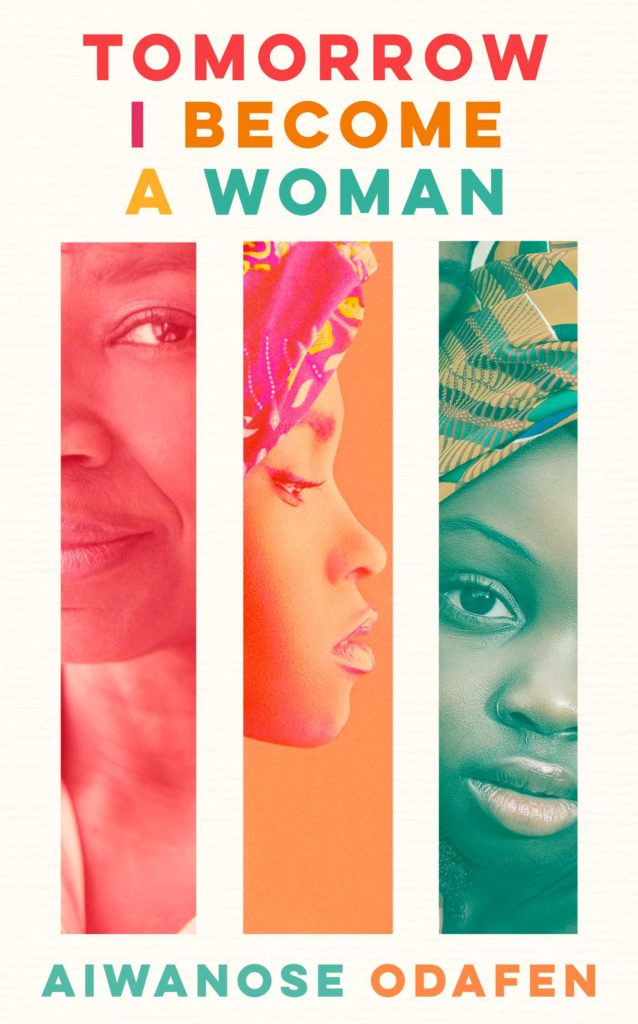
1.
I’m going to marry him
We stood side by side in March of ’94, arms around each other with milky pasted smiles, displaying all our teeth for the cameramen shouting, ‘Oga, please look this way,’ and ‘Madam, please move closer to oga,’ as we cut the ribbon to the factory Gozie was opening in his hometown. Our pictures would appear in the glossy pages of society magazines, above flowery articles of the business exploits of Chigozie Azubuike, a respected member of the community, and his dutiful wife, one Obianuju Azubuike née Nwaike, who’d stood by him through the toughest of times. Mama would buy dozens of copies and distribute them to all her friends and members of Ndigbo Women’s Association of Lagos and show every visitor that crossed the threshold of her and Papa’s household; her daughter, her own Uju, was now a star.
Church members would approach me with timid smiles to say, ‘I saw you in “so-and-so” magazine,’ and compliment my expensive wrapper and head-tie, my designer shoes. And I would smile with just the right blend of pleasure, humility and satisfaction, tilt my head elegantly and say, ‘Thank you.’
Just days before, an expensive earthenware vase with hand-painted red roses, the one Gozie had bought on his last trip to China, cracked on the wall just above my head and shattered in an icy rain around me.
‘You’re a witch!’ Gozie screamed. And I knew I’d dream of those words, the letters dancing in circles around me – you’re a witch! You’re a witch!
We met at church – the perfect place for an upstanding Christian girl to find a husband – on a Sunday in August of ’78. I was a student at the University of Lagos at the time, with only a few months left till graduation.
The church was alive that Sunday, the air electric with fate. The atmosphere bubbled with music and people. Smiling women in floor-length skirts and colourful headscarves stood at the entrance distributing flyers, and men in oversized trousers directed us to our seats.
My friends Adaugo and Chinelo had pestered me to attend service that day, and I finally caved when they threatened to report me to Mama. Nothing was scarier than Mama showing up at school, wearing that frown of hers that would make even the devil quiver. I could picture Mama in the matching wrapper and head-tie she always wore for her Ndigbo women’s meeting, with wafts of her hair sticking out the open top. ‘Obianuju! Obianuju! Tell me what I heard isn’t true!’ she would yell. No. I’d have rather faced the devil himself, and my evil friends knew it.
The three of us had been inseparable since we were waddling about in diapers, and our mothers had the black and white photographs– showing tiny chubby versions of ourselves and flashing toothless grins – to prove it. There was a story to this. Our mothers had met in the late forties at the back of a packed bus. The three of them were young and newly married Igbo women on a one-way trip, from the southeastern region of Nigeria to Lagos, to meet the husbands their parents had chosen and married for them in absentia. Terrified of their unknown futures, they had created an unbreakable friendship at the back of that bus, one so thick it had withstood time and all its tests. Mama always said she would never have survived the city without them by her side: they were her godsends.
It wasn’t a very large church but a branch of the new Pentecostal wave that was sweeping through the country. The pews were arranged in a semi-circle and faced a wooden pulpit with a microphone at the front of the hall. And the room was coloured in a warm glow from the overhanging orange lights.
My agreement to attend church had been temporary until I could come up with a good enough bargain to get myself out of it the following Sunday. I’d even made sure to dress rebelliously – my skirt was an inch above the acceptable length, and my makeup was more heavy-handed than usual. But walking in there that day, I knew I’d be back.
Instrumentals blared from the side of the pulpit and out through the building and its open doors and windows as the service started. Men and women danced and shouted and waved their hands above their heads in rhythm with the music, a strikingly different form of worship from the solemn assemblies of the orthodox churches we’d been raised in. I watched in surprise as my friends joined in, dancing and screaming like everyone else, encouraging me to do so as well. But the session ended abruptly, before I could fully absorb the goings-on around me.
A young man with striking features approached the pulpit, his hair combed out in a soft Afro. I thought he looked like he’d walked out of one of the myths of African gods. He picked up a microphone and opened his mouth to let out the most beautiful sound I’d ever heard. His rich tenor rang throughout the auditorium, enunciating each word and hitting all the right notes. I sat, rooted to my seat, and watched his lips move, moving mine as well with lyrics I’d known my whole life but with a different subject of adulation in mind.
Let angels prostrate fall;
Bring forth the royal diadem,
And crown Him Lord of all!
Shuffling to my feet, I looked around to confirm I wasn’t the only one mystified by this angelic creature. A lady in the row behind me was smiling so wide, I knew her thoughts were unfit for a church service. Even the choir members behind him seemed to be enchanted, their eyes darting back and forth between the heavens and the mortal before them, seemingly unable to make up their minds who mattered more.
The hymn ended before I was ready for it to, and I followed as the man who’d arrived out of my imagination walked off the stage. A solemn man with large reading glasses slowly climbed up the steps to the stage to take his place and cleared his throat to begin the sermon.
He spoke for an hour with vigour and power, sweat pouring down the sides of his face and moisture gathering round the chest and armpits of his shirt. Around me, people jumped to their feet and shouted ‘Hallelujah’ and ‘Amen’ at the top of their lungs. But I was lost in another world, where the only people that existed were myself and the handsome man with the voice from heaven.
‘Who was that?’ I asked Ada and Chinelo that evening in our small shared university room.
‘Who was who?’ Chinelo replied, not bothering to look at me as she rolled over on her bed, flipping through the pages of a novel. On the front cover, a man held a woman from behind as she arched her back in an exaggerated display of passion. I wondered if she’d quarrelled with Christopher – the cute Chemical Engineering student she was dating – again. Every time they had an argument, she would return to the university hostel with a new romance novel, where the men were perfect and acted the way she wanted, and would complain of heat in her chest, saying that she could feel the heartbreak. The last time, I’d told her it wasn’t heartbreak but heartburn from the peppery food she consumed so often.
She stretched out her arm to pick from a bowl of chin chin beside her and filled the room with the kra kra of her chewing.
‘You know who – the guy. That guy!’ I insisted, my hands on my hips.
‘Which guy?’ Ada asked obtusely, her own eyes fixed on the glossy magazine in her hands. ABBA’s ‘Dancing Queen’ filtered through a small radio beside her, and she hummed the lyrics underneath her breath. ‘Do you think she had surgery done?’ she said, pointing at a celebrity whose nose had become slimmer overnight. It was one of the many old magazines we collected from our classmates who regularly went to the United States over the summer. Sometimes they brought back wedding magazines as well, and we admired the expensive dresses we knew we’d never wear and imagined grand weddings that would never happen.
Ada flipped the page over, not bothering to wait for a response, and clapped her hands together. ‘Ahh, ahh! The latest hairstyles.’ She turned the open magazine to face me, a wide smile on her face. ‘What do you think? Which one will suit me the best? This one or this one?’ The first hairstyle was a bob with a fringe that could only have been achieved by the tortuous application of heat, the second a head full of tiny cornrows braided with extensions and decorated with colourful beads and cowries, so many that I feared for the model’s neck.
Ada rolled her eyes. ‘Answer me now; I need to change my hairstyle. Or can’t you see?’ She patted the large pink rollers in her hair for emphasis.
Chinelo stretched her neck away from her book to peep at the magazine. ‘The braids look good o.’
‘Can the both of you please pay attention!’
They both turned to stare at me. ‘Nne, what is it?’ Ada asked.
‘I asked who was that? And before you say “who” again, I mean the choir guy with the voice.’ I silently inserted ‘heavenly’ before ‘voice’.
‘Oh! That one?’ Chinelo replied nonchalantly. ‘He’s the lead chor- ister o. What’s that his name again? Go—Gozie. Yes, Gozie, that’s his name.’
Ada giggled. ‘If you’re interested in him, you better join the queue because every girl in church is gunning for that one. I don’t even know what they see. Fine boy, no kudi. Fine face cannot buy food.’
We all laughed; it was such a Lagosian statement to make – the city was a melting pot for several tribes, from Igbo to Yoruba to Igala, and so we threw words around that weren’t indigenously ours and forgot that kudi was Hausa for money and ode, another word we often used, was Yoruba for a daft person.
I smiled, wide and big. ‘I don’t care what you say; I’m going to marry him.’
They burst into even more riotous laughter.
‘What is it? You dey go clean church?’ Adaugo demanded through bloodshot eyes after I tapped her awake the next Sunday. It was three hours before service.
Chinelo eyed my sober attire of ankle-length skirt and long-sleeved blouse, with a matching silk scarf. ‘Mother Mary!’ she shouted before bursting into laughter, her fair skin turning red.
I ignored her. I was determined to look the part.
‘You better wake up this early for class tomorrow,’ Ada grumbled minutes later as we left our room.
‘I don’t know what you mean. I always wake up early,’ I retorted, not meeting her eyes.
The early-morning Sundays and loitering around the church prem- ises long after sermons became a ritual, until even my friends, having reached their limit, abandoned me to my endeavours. ‘If you wake me up early again, I’ll break your head. I’ll see you in church!’ Ada said to me in a voice that told me she meant every word.
I carried on like a pagan worshipping its god from afar, lighting a candle at its altar; I watched him, listened to him sing, and tested out how our names sounded together.
The day I finally summoned the courage to approach Gozie, the pastor spoke about perseverance and determination. ‘Go after what you desire. Faith without work is dead.’ He’d barely finished saying ‘Amen’ when I dragged Ada and Chinelo in the direction of the choir, stretching my long legs to cover as much ground as quickly as possible. But there were those ahead of me who’d heard the message as well. They surrounded him like ants on a sugar cube, fluttering their lashes and waving their colourful handkerchiefs like butterflies.
Finally, after several minutes of waiting, it was our turn. At this point, I was sure I didn’t stand a chance, but I had nothing to lose. He moved closer, a charming smile stretched across his face. He was even more arresting up close. His skin glowed like polished wood and his dark eyes sparkled with intelligence. His features were epicene – angular and strong enough for a man but soft like a woman’s. He stood taller than I’d expected and had shoulders so broad they pulled at the material of his starched white shirt.
Ada stretched out her arm to shake his hand. ‘Brother Gozie, we enjoyed your ministration today.’
His smile widened. ‘Thank you. I try my best.’
Ada pulled me forward. ‘Have you met my friend? She’s new to our church. She really enjoyed your ministration too.’
He turned to look at me and all the words I’d so carefully prepared disappeared and my voice was replaced by something little above a whisper.
‘Hi. Obianuju. U-Uju for short,’ I mumbled, gripping his outstretched hand.
He smiled again; he was used to this, the effect he had on people. Chinelo prodded me in the back to say more.
‘I really enjoyed your singing; it was heavenly.’
‘Thank you,’ he replied graciously. ‘I hope you’ll keep coming to our church.’
‘She’ll keep coming,’ Chinelo jumped in enthusiastically before I could utter a word. ‘She’s our good friend and a really nice girl . . .’
I stood quietly as she extolled my virtues, like a market woman trying to sell off her goods.
He nodded politely when she was done. ‘It’s nice to know that. Hope to see you next Sunday,’ he said, then moved on like we were a kiosk at a colourful carnival.
Ada faced me with a frown. ‘What happened?’
‘I don’t know,’ I mumbled and lowered my head.
Chinelo tapped my back. ‘Don’t take it personally Uju; he is a very popular guy. Who knows, he might talk to you another day.’
‘Another day’ came many weeks later. Service had ended, and we sat talking with Sister Chinasa, the head of the ushering unit I’d just joined. She was explaining the many complexities of ushering – standing like statues throughout service, collecting offerings, quieting rude chatty teenagers. Gozie sauntered over confidently, his hands in the pockets of his grey trousers, and rested against a pillar beside us quietly. I pretended not to see him. Sister Chinasa paused the moment she noticed him. ‘Brother Gozie, good afternoon,’ she said with the same dazzled smile every woman sent his way. I felt jealousy curl like a hot ball in my chest.
‘Good afternoon, Sister Chinasa,’ he replied evenly. ‘Do you mind if I speak with Sister Uju for a few minutes?’ he asked. It took Ada pinching me to make me realise he was referring to me, Uju. Brother Gozie wanted to talk to me?
Sister Chinasa giggled nervously. ‘Of course, of course,’ she said pushing at my shoulder a bit too forcefully. Chinelo winked at me as I slowly got to my feet, stunned.
When we were far enough from the group, he stopped at a pillar and turned to me. ‘Sister Uju, how are you?’
I blinked. Was that what he’d called me aside to ask?
‘I-I’m fine,’ I stuttered.
Then he said the words I’d imagined but never thought possible.
‘Sister Uju would you be free on Tuesday after mid-week service? I’d like to take you out.’
‘Yes! Yes!’ I near screamed.
***
Buy Tomorrow I Become A Woman: Simon & Schuster | AmazonUK
From TOMORROW I BECOME A WOMAN by Aiwanose Odafen, published by Scribner, an imprint of Simon & Schuster. Copyright © 2022 by Aiwanose Odafen


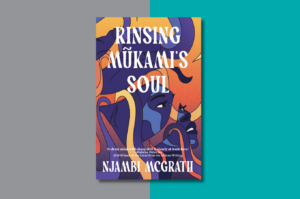
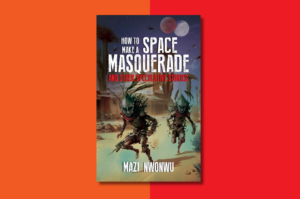
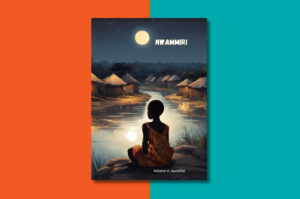

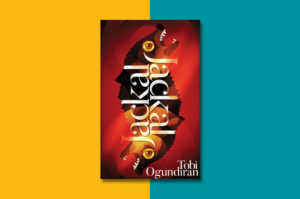


COMMENTS -
Reader Interactions